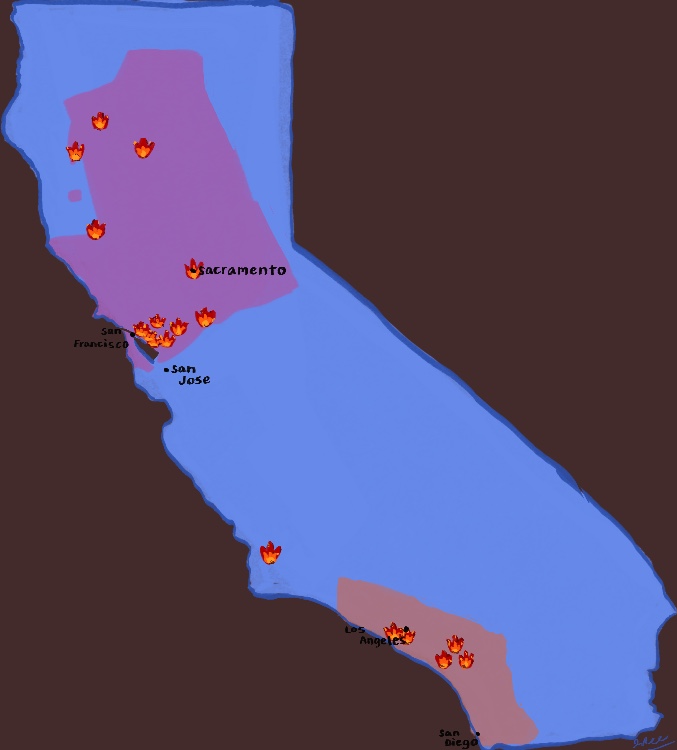It’s Sept. 1. A red bag with a white cross sits by the door. During our spring cleaning years ago, my father discovered expired soup cans inside of it. He said one day he would replace them.
It’s Oct. 23. Until today, he hadn’t bothered to stack the Amy’s atop the Progressos atop the Rancho Gordos at the Safeway. Until today, he hadn’t bothered with flashlight batteries, the collapsible fire escape ladder rusting in my mother’s shoe box or the browning brush outside the French doors.
It’s Oct. 30. We now share phone calls in the dark, each outage giving us a reason for another early goodbye.
Every night this week, they sleep in the wind, that eucalyptus we had cut last summer the lone savior, the gap in the forest that would burn without it. We pray for stillness, for nature to quarantine its breezes up north, for this hell-fire to freeze before it melts southward.
But it’s selfish in this would-be apocalypse to wish it doesn’t reach us because, really, in the mustard yellow PG&E map, the dark purple Air Quality Index map, we’ve already been reached.
In these east-coast October storms, my thirst rises, the downpour transporting me to the dryness of my home. I’m soaked this Sunday afternoon and there is my family, searching the warm refrigerator for the cold on the innermost center of the peaches in the vegetable drawer, to no avail.
I look at the string of 8s and 0s this week and next, cartoon suns and clouds not of fluffy cumulus vapor, but ash — the National Weather Service doesn’t know what to color these clouds.
The LA Times just declared this coastal strip inevitably unlivable — the next flame catching on a golden gate power line — this bay no longer a gateway to plates of gold but walls of fire. Desire lines will be drawn to the east — refugees in covered wagons, reversing this country’s already minute history into an erasure. An erasure of those San Francisco hills, turned back to dunes, fishing towns back to full schools of fish, and lastly, forests to barren scapes where no Native can hide from pirate, no mouse from hawk.
This week, her Sonoma family “under fire,” our poetry teacher arrives late to Bobst, evacuation orders in the distant future, yet Wallace Stevens dictating the class agenda. His objective realities now my words’ only entrance, my memories of the west coast abstracted, these New York rainfalls ashen — I once thought my green jacket had greyed in settled chimney smoke.
This city’s humid cloud pulls sweat out of my skin like the flames that any day could bathe our house’s cedar shingles in an amber rising rain. Downpouring what-ifs — the alarm that never entered my brother’s sleeping ears, the kennel cab that never made it to the cat in time.
I remember the morning we raced umbrella boats in the high school parking lot, each year more closures with the rising tides, the infiltration of the salty wetlands, it seemed, into our classrooms. Those trash pick-up days, little reminders for how many remnants of our lives resurface in fly-swarms on green shores.
On the phone with my mother, I heard not her exhales between words, but the chopping blades of a helicopter above my house, one hovering over each valley in the county, waiting for that first sign of discoloration.
Discolored are my returns, with backyards wiped dry and 100-ringed stumps as coffee tables. Reinventing our home as a place where we might accommodate the conditions that rage outside ourselves. Our condition: accepting we’ll outlast the Redwood steeples between whose green needles we used to stargaze.
Email Maxine Flasher-Duzgunes at [email protected].


























































































































































